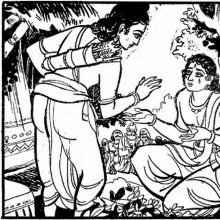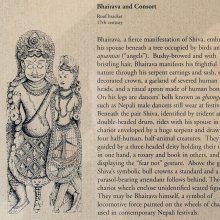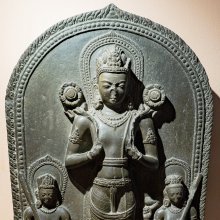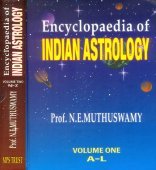Shash, Ṣaṣ, Sash, Śas, Śās, Ṣaḍ, Śāḍ, Śaṣ, Śad, Shas, Shad: 26 definitions
Introduction:
Shash means something in Buddhism, Pali, Hinduism, Sanskrit, Marathi, Hindi, biology. If you want to know the exact meaning, history, etymology or English translation of this term then check out the descriptions on this page. Add your comment or reference to a book if you want to contribute to this summary article.
The Sanskrit terms Ṣaṣ and Śas and Śās and Ṣaḍ and Śāḍ and Śaṣ and Śad can be transliterated into English as Sas or Shash or Shas or Sad or Shad, using the IAST transliteration scheme (?).
Images (photo gallery)
In Hinduism
Vyakarana (Sanskrit grammar)
Source: Wikisource: A dictionary of Sanskrit grammar1) Ṣaṣ (षष्).—(षट् (ṣaṭ)) a technical term used in Panini's grammar for such numeral words (संख्थाशब्द (saṃkhthāśabda)) as end with ष् (ṣ) or न् (n) e. g. षष्, पञ्चन्, सप्तन् (ṣaṣ, pañcan, saptan) etc.; cf. ष्णान्ता षट् (ṣṇāntā ṣaṭ) P. I. 1.24.
2) Śas (शस्).—(l) case affix (अस् (as)) of the accusative plural;cf. स्वौजसमौट्शस् (svaujasamauṭśas)o P.IV. 1.2; (2) tad.affix applied to words meaning much or little as also to a numeral; e.g. बहुशो ददाति, अल्पशो ददाति, द्विशः, त्रिशः, पादशः (bahuśo dadāti, alpaśo dadāti, dviśaḥ, triśaḥ, pādaśaḥ) etc., cf. P. V.4.42, 43.

Vyakarana (व्याकरण, vyākaraṇa) refers to Sanskrit grammar and represents one of the six additional sciences (vedanga) to be studied along with the Vedas. Vyakarana concerns itself with the rules of Sanskrit grammar and linguistic analysis in order to establish the correct context of words and sentences.
Ayurveda (science of life)
Source: archive.org: Vagbhata’s Ashtanga Hridaya Samhita (first 5 chapters)Ṣaḍ (षड्) refers to an attribute of rasa and is mentioned in verse 1.15 of the Aṣṭāṅgahṛdayasaṃhitā (Sūtrasthāna) by Vāgbhaṭa.—Ṣaḍ has been regarded by the scholiasts as an attribute of rasa (14c), in obvious analogy to sapta and dhātu (13bc), though an enjambment like this is none too frequent in Sanskrit. In Tibetan, it has been connected with dravya, which shows that the translators read ṣaḍdravyam (in one word) rather than sad dravyam (in two words), taking the phrase for a dvigu.

Āyurveda (आयुर्वेद, ayurveda) is a branch of Indian science dealing with medicine, herbalism, taxology, anatomy, surgery, alchemy and related topics. Traditional practice of Āyurveda in ancient India dates back to at least the first millenium BC. Literature is commonly written in Sanskrit using various poetic metres.
Shaivism (Shaiva philosophy)
Source: Brill: Śaivism and the Tantric Traditions1) Ṣaṣ (षष्) or Ṣaṇmāsa refers to “six months” (observance of the raudravrata), according to the Kiraṇatantra chapter 49 (dealing with vratacaryā).—Accordingly, “Garuḍa spoke: ‘You have taught me, O great Lord, the activities of the Neophyte, the Putraka and the Ācārya. Tell me those of the Sādhaka’. The Lord spoke: ‘[...] This is the auspicious Raudra-vrata: imposing with a chignon of matted locks, marked by a trident and khaṭvāṅga, equipped with a clean half skull, awe-inspiring with a third eye, clothed in the skin of a tiger, peaceful. For one firm [in this observance, the highest siddhi will arise in six months] (ṣaṣ-māsa—ṣaḍbhirmmāsaiḥ); middling [powers] in four months; the lowest [powers] will arise in three months. [...]’”.
2) Ṣaṣ (षष्) or Ṣaḍdiś refers to “six (directions)”, according to the Vṛtti on the Īśvarapratyabhijñākārikā 1.5.6, 20-21.—Accordingly, “Moreover, [the existence of] the external object is refuted by a means of [valid] knowledge if it has parts, because of [the necessity then] of attributing to it contradictory properties, etc.; [and it is contradicted] in many ways if it has no parts, because [then] it must be in contact with the six directions (diś-ṣaṭka-yoga-ādi), etc.”.
3) Ṣaṣ (षष्) or Ṣaḍdhātu refers to the “(theory of the) six elements”, according to Utpaladeva’s Vivṛti on Īśvarapratyabhijñākārikā 1.5.6.—Accordingly, “[...] For it is not [universally acknowledged that] no [perception] at all can be accounted for without speculating about the [imperceptible] sense organs; thus some propound the theory of the six elements (ṣaḍdhātu) while not taking the sense organs into account in any way, [and] others defend the theory of the two [sorts of combinations of four elements—namely, the sort that produces consciousness and the one that does not—without taking imperceptible sense organs into account either]. [...]”
Source: SOAS University of London: Protective Rites in the Netra Tantra1) Ṣaṣ (षष्) or Ṣaḍaṅga [=aṅgaṣaṭka?] refers to the “six (Aṅgas)” (of the Mṛtyuñjaya-mantra), according to the Netratantra of Kṣemarāja: a Śaiva text from the 9th century in which Śiva (Bhairava) teaches Pārvatī topics such as metaphysics, cosmology, and soteriology.—Accordingly, [verse 2.28cd-33]—“Now, I shall explain the limbs of the mantra, with which, tied together, he achieves perfection. [...] The netra [aṅgamantra], [which is] most powerful and destroys all faults, begins with Bhairava [j], and an oṃ [and] situated with a head always in motion [y]. That astramantra is proclaimed ajīvaka [pha] joined with ṭa. The six Aṅgas (aṅgaṣaṭka) of the mantrarāṭ [i.e., the mṛtyuñjayamantra], which confers siddhis, is declared”.
2) Ṣaṣ (षष्) or Ṣaṭkāraṇa refers to the “six (causes) (of the great sounds)”, according to the Netratantra.—Accordingly, [verse 22.15]—“[Praṇava enables him to grasp] the great six-fold path (ṣaṣ-prakārā) [of emanation an reabsorption]. [This path is] established by the six causes (ṣaṣ-kāraṇa-padasthita) [of the great sounds]. [The Mantrin] makes sacrifices [into fire] with all knowledge (vidyā), which has been propelled by the sound juṃ”.

Shaiva (शैव, śaiva) or Shaivism (śaivism) represents a tradition of Hinduism worshiping Shiva as the supreme being. Closely related to Shaktism, Shaiva literature includes a range of scriptures, including Tantras, while the root of this tradition may be traced back to the ancient Vedas.
Shaktism (Shakta philosophy)
Source: Google Books: ManthanabhairavatantramṢaṣ (षष्) or Ṣaḍdevī refers to the “six (Goddesses)”, according to the Kularatnoddyota (verse 2.4cd-10).—Accordingly, “[The Śrīkula is] accomplished by the Command and, supremely divine, it is adorned with the lineage of the Śrīkrama. [...] It is called the Lineage of the Siddhas and is attended by Yoginīs and Siddhas. (The teaching concerns) many Wheels and it is presided over by the Six Goddesses (ṣaṣ-devī-adhiṣṭhita). It includes the six-fold deposition and its forms are Mudrā and maṇḍala. It includes (the teachings concerning) the group of eight Mothers and the liturgy of the Sacred Seats, the beginningless liturgy called that of the Child, Youth and the Aged. [...]”.

Shakta (शाक्त, śākta) or Shaktism (śāktism) represents a tradition of Hinduism where the Goddess (Devi) is revered and worshipped. Shakta literature includes a range of scriptures, including various Agamas and Tantras, although its roots may be traced back to the Vedas.
In Buddhism
Mahayana (major branch of Buddhism)
Source: Wisdom Library: Maha Prajnaparamita SastraṢaṣ (षष्) or Ṣaḍindriya refers to the “six sense organs”, according to Mahāprajñāpāramitāśāstra (chapter 19).—Accordingly, “When generosity is practiced, the six sense organs (ṣaṣ-indriya) are purified (prasanna) and a good mind of desire (kuśalakāmacitta) is produced. When this is produced, the inner mind (adhyātmacitta) is purified. When the virtues (guṇa) of the fruit of retribution (vipākaphala) are considered, a mind of faith (śraddhacitta) is produced. The body (kāya) and the mind (citta) become softened (mṛdutaruṇa), joy (ānanda) arises. Joy having arisen, a ‘single-mindedness’ (ekacitta) is obtained, thanks to which real wisdom (bhūtaprajñā) is produced: these are the good dharmas that are acquired”.

Mahayana (महायान, mahāyāna) is a major branch of Buddhism focusing on the path of a Bodhisattva (spiritual aspirants/ enlightened beings). Extant literature is vast and primarely composed in the Sanskrit language. There are many sūtras of which some of the earliest are the various Prajñāpāramitā sūtras.
Biology (plants and animals)
Source: Google Books: CRC World Dictionary (Regional names)Sas in Nepal is the name of a plant defined with Terminalia alata in various botanical sources. This page contains potential references in Ayurveda, modern medicine, and other folk traditions or local practices It has the synonym Pentaptera tomentosa Roxb. ex DC., nom. illeg., nom. superfl. (among others).
Example references for further research on medicinal uses or toxicity (see latin names for full list):
· Prodr. Flora Indica, or ‘Descriptions of Indian Plants’ Orient. (1834)
· Novae Plantarum Species praesertim Indiae Orientalis (1821)
· Prodr. (1828)
· Cat. Ind. Pl. (1833)
If you are looking for specific details regarding Sas, for example pregnancy safety, extract dosage, side effects, health benefits, diet and recipes, chemical composition, have a look at these references.

This sections includes definitions from the five kingdoms of living things: Animals, Plants, Fungi, Protists and Monera. It will include both the official binomial nomenclature (scientific names usually in Latin) as well as regional spellings and variants.
Languages of India and abroad
Marathi-English dictionary
Source: DDSA: The Molesworth Marathi and English Dictionaryṣaṣ (षष्).—a pl S Six.
Marathi is an Indo-European language having over 70 million native speakers people in (predominantly) Maharashtra India. Marathi, like many other Indo-Aryan languages, evolved from early forms of Prakrit, which itself is a subset of Sanskrit, one of the most ancient languages of the world.
Sanskrit dictionary
Source: DDSA: The practical Sanskrit-English dictionaryŚad (शद्).—I. 1 P. (but Ā. in conjugational tenses) (śīyate, śanna)
1) To fall, perish, decay, wither.
2) To go. -Caus. (śādayati-te)
1) To cause to go, impel.
2) (śātayati-te) (a) To fell, throw down, cut down; किं भूभृत्कटकस्थितिव्यसनिना व्यर्थं खुराः शतिताः (kiṃ bhūbhṛtkaṭakasthitivyasaninā vyarthaṃ khurāḥ śatitāḥ) Subhāṣ.; Śiśupālavadha 14. 8;15.24. (b) To kill, destroy. -II 1. P. (śadati) To go (usually with ā).
--- OR ---
Śāḍ (शाड्).—1 Ā. To praise, extol.
--- OR ---
Sad (सद्).—1 P. (6 P. also according to some) (sīdati, sanna; the s of sad is changed to [ṣ] after any preposition ending in i or u except prati)
1) To sit down, recline, lie, lie down, rest, settle; अमदाः सेदुरेकस्मिन् नितम्बे निखिला गिरेः (amadāḥ sedurekasmin nitambe nikhilā gireḥ) Bhaṭṭikāvya 7.58.
2) To sink down, plunge into; सीदन्ति च तदा यक्षाः कूला इव जलेन ह (sīdanti ca tadā yakṣāḥ kūlā iva jalena ha) Rām.7.14.18; तेन त्वं विदुषां मध्ये पङ्के गौरिव सीदसि (tena tvaṃ viduṣāṃ madhye paṅke gauriva sīdasi) H. Pr.24.; where the word has sense 4 also).
3) To live, remain, reside, dwell.
4) To be dejected or low-spirited, despond, despair, sink into despondency; दृष्ट्वैव सागरं वीक्ष्य सीदन्तीं कपिवाहिनीम् (dṛṣṭvaiva sāgaraṃ vīkṣya sīdantīṃ kapivāhinīm) Rām.7.35.4; नाथ हरे जय नाथ हरे सीदति राधा वासगृहे (nātha hare jaya nātha hare sīdati rādhā vāsagṛhe) Gīt. 6.
5) To decay, perish, go to ruin, waste away, be destroyed; विपन्नायां नीतौ सकलमवशं सीदति जगत् (vipannāyāṃ nītau sakalamavaśaṃ sīdati jagat) H.2.77; तं सन्नशत्रुं ददृशुः स्वयोधाः (taṃ sannaśatruṃ dadṛśuḥ svayodhāḥ) R.7.64; H.2.13.
6) To be in distress, be pained or afflicted, be helpless; सीदता- मनुभवन्निवार्थिनां वेद यत्प्रणयभङ्गवेदनाम् (sīdatā- manubhavannivārthināṃ veda yatpraṇayabhaṅgavedanām) Kirātārjunīya 13.6; Manusmṛti 8.21.
7) To be impeded or hindered; धर्मे सीदति सत्वरः (dharme sīdati satvaraḥ) Ms. 9.94.
8) To be languid, be wearied or fatigued, droop, sink; सीदति मे हृदयम् (sīdati me hṛdayam) K,; सीदन्ति मम गात्राणि (sīdanti mama gātrāṇi) Bhagavadgītā (Bombay) 1.29.
9) To go, -Caus. (sādayati-te)
1) To cause to sit down, rest.
2) To throw or cast down, place, put.
3) To weary, exhaust.
4) To cause to perish, destroy; बहुसमरनयज्ञः सादयिष्यन्नरातिम् (bahusamaranayajñaḥ sādayiṣyannarātim). -Desid. (siṣatsati) To wish to sit &c.
--- OR ---
Sad (सद्).—f. An assembly; पृष्टः प्राह तमाभाष्य शृण्वत्यास्तत्सदः कथाः (pṛṣṭaḥ prāha tamābhāṣya śṛṇvatyāstatsadaḥ kathāḥ) Bhāgavata 7.1.21.
Source: DDSA: The practical Sanskrit-English dictionaryŚaṣ (शष्).—1 P. (śaṣati) To hurt, injure, kill.
--- OR ---
Śas (शस्).—I. 1 P. (śasati) To cut up, kill, destroy. -II. 2 P. (śasti) To sleep. Cf. शंस् (śaṃs) also.
--- OR ---
Śas (शस्).—
1) A technical name for the termination of the acc. plural.
2) A Taddhita affix forming adverbs from nouns, especially from numerals; as द्विशः, शतशः, बहुशः (dviśaḥ, śataśaḥ, bahuśaḥ) &c.
--- OR ---
Śās (शास्).—2 P. (śāsti, śaśāsa, aśiṣat, śāsiṣyati, śāsitum, śiṣṭa)
1) To teach, instruct, train (governing two accusatives in this sense); माणवकं धर्म शास्ति (māṇavakaṃ dharma śāsti) Sk.; Bhaṭṭikāvya 6.1; शिष्य- स्तेऽहं शाधि मां त्वां प्रपन्नम् (śiṣya- ste'haṃ śādhi māṃ tvāṃ prapannam) Bhagavadgītā (Bombay) 2.7.
2) To rule, govern; अनन्यशासनामुर्वी शशासैकपुरीमिव (ananyaśāsanāmurvī śaśāsaikapurīmiva) R.1.3;1.1;14.85;19.57; Ś.1.25; Bhaṭṭikāvya 3.53.
3) To order, command, direct, enjoin; इति रामो वृषस्यन्ती वृषस्कन्धः शशास ताम् (iti rāmo vṛṣasyantī vṛṣaskandhaḥ śaśāsa tām) R.12.34; त्वामागतः शासितुम् (tvāmāgataḥ śāsitum) Mv.6.2; Kumārasambhava 6.24; Bhaṭṭikāvya 9.68.
4) To tell, communicate, inform (with dat.); तस्मिन्नायोधनं वृत्तं लक्ष्मणायाशिषन्महत् (tasminnāyodhanaṃ vṛttaṃ lakṣmaṇāyāśiṣanmahat) Bhaṭṭikāvya 6.27; Manusmṛti 11.83.
5) To advise; स किंसखा साधु न शास्ति योऽधिपम् (sa kiṃsakhā sādhu na śāsti yo'dhipam) Kirātārjunīya 1.5.
6) To decree, enact.
7) To punish, chastise, correct; तान् शिष्याच्चौरदण्डेन धार्मिकः पृथिवीपतिः (tān śiṣyāccauradaṇḍena dhārmikaḥ pṛthivīpatiḥ) Manusmṛti 8.29;4.175; V.5.
8) To tame, subdue; सौमित्रेश्चरणौ न चेत्तदिषुभिः शासिष्यसे दुर्मदः (saumitreścaraṇau na cettadiṣubhiḥ śāsiṣyase durmadaḥ) Mv.6.2.
9) To wish, desire.
--- OR ---
Śās (शास्).—m. A reciter; as in उक्थशास् (ukthaśās).
--- OR ---
Ṣaṣ (षष्).—num. a. (used in pl., nom. ṣaṭ; gen. ṣaṇṇām) Six; तेषां त्ववयवान् सूक्ष्मान् षण्णामप्यमितौजसाम् (teṣāṃ tvavayavān sūkṣmān ṣaṇṇāmapyamitaujasām) Manusmṛti 1.16;8.43.
--- OR ---
Sas (सस्).—2 P. (sasti) To sleep.
Source: Cologne Digital Sanskrit Dictionaries: Shabda-Sagara Sanskrit-English DictionaryŚaḍ (शड्).—[(i)śaḍi] r. 1st cl. (śaṇḍati) 1. To disease or disorder. 2. To hurt or wound. 3. To collect, to heap together.
--- OR ---
Śad (शद्).—[(au, ḷ,)au śadaḷ] r. 1st cl. (śīyate) 1. To perish gradually, to wither or decay. 2. To fall. 3. To throw down. 4. To go, to move.
--- OR ---
Śāḍ (शाड्).—[(ṛ)śāḍṛ] r. 1st cl. (śāḍate) 1. To flatter, to praise, to coax. 2. To boast. 3. To float or swim.
--- OR ---
Ṣad (षद्).—[(au ḷ)auṣadḷ] r. 1st and 6th cls. (sīdati) 1. To wither, to wane, to perish gradually. 2. To be low-spirited, to despond, to be wearied or distressed, to lack energy. 3. To break or destroy. 4. To go or move. With āṅ prefixed, āṣadḷ r. 1st and 10th cls. (āsādati āsādayati-te) 1. To go. 2. To assail, to encounter. With ava prefixed, 1. To be exhausted or languid. 2. To finish. With āṅ, 1. To obtain, to attain, to reach or arrive at. 2. To attack. With ut, 1. To ascend. 2. To destroy. With upa, 1. To approach. 2. To worship. With ni, 1. To sit in or on. 2. To stand. 3. To protect. With pra, 1. To be propitious to, to favour or be pleased with. 2. To please or propitiate. 3. To purify. 4. To smile. With vi, To be languid or sorrowful. With sam, 1. To attain. 2. To be in company or society with.
Source: Cologne Digital Sanskrit Dictionaries: Shabda-Sagara Sanskrit-English DictionaryŚaś (शश्).—r. 1st cl. (śaśati) To jump, to leap, to move by springing or leaping.
--- OR ---
Śaṣ (शष्).—r. 1st cl. (śaṣati) To hurt, to injure, to wound or kill.
--- OR ---
Śas (शस्) or Śasi.—and the preposition āṅ usually prefixed āśasi r. 1st cl. (āśaṃsate) 1. To bless, to wish good to, to confer a benediction. 2. To wish, to desire. 3. To speak. (u) śasu r. 1st cl. (śasati) To hurt, to injure, to wound or kill. With abhi, To intreat. With vi, To kill. r. 2nd cl. śasti To dream.
--- OR ---
Śās (शास्).—[(u)śāsu] r. 2nd cl. (śāsti) 1. To instruct, to inform. 2. To order, to direct, to enact. 3. To rule, to govern. 4. To correct, to punish. 5. To advise. (śāste) 1. To wish or desire: with āṅ prefixed, r. 1st cl. (āśāsate) r. 2nd cl. (āśāste) To wish well to, to bless.
--- OR ---
Ṣaṣ (षष्).—mfn. Plu. only (ṣaṭ or ṣaḍ) Six.
--- OR ---
Ṣas (षस्).—r. 2nd cl. (sasti) To sleep.
--- OR ---
Sas (सस्).—r. 2nd cl. (sasti) To sleep; also ṣas .
Source: Cologne Digital Sanskrit Dictionaries: Benfey Sanskrit-English DictionaryŚad (शद्).— substitutes in the pres., imperf., imperat., and potent. the pass. of śī, viz. śīya; in the remaining forms, [Parasmaipada.] To fall, [Bhaṭṭikāvya, (ed. Calc.)] 17, 77 (śīya). [Causal.] I. śātaya (probably a [denominative.], perhaps from an anomal. ptcple. of the pf. pass. śāta for śatta, cf. the substitution of a vowel long by nature for one long by position, and vice versā in the [Prakrit] languages), To fell, to throw down, [Rāmāyaṇa] 1, 66, 10. śātita, Cut off, [Rāmāyaṇa] 1, 66, 12, Seramp. Ii. śādaya, To drive, [Pāṇini, (ed. Böhtlingk.)] vii. 3, 42.
— With the prep. pra pra, [Causal.] śātaya, To break off, Mahābhārata 1, 5561.
— With vi vi, [Causal.] śātaya, To break to pieces, Mahābhārata 3, 11971.
— With sam sam, [Causal.] śātaya, The same, Mahābhārata 3, 865.
— Cf. [Latin] cadere.
--- OR ---
Śāḍ (शाड्).—or śāl ŚĀL, i. 1, [Ātmanepada.] To praise.
--- OR ---
Sad (सद्).—i. 1 and 6, sīda (for sisada), [Parasmaipada.] (in epic poetry also Atm., Mahābhārata 1, 5184), 1. To sink down, to lie, [Rāmāyaṇa] 3, 74, 31. 2. To sit down (ved.). 3. To become helpless, [Mānavadharmaśāstra] 4, 191; to be in distress, [Pañcatantra] ii. [distich] 24. 4. To be impeded, [Mānavadharmaśāstra] 9, 94. 5. To be low-spirited, dejected, Mahābhārata 1, 2061; [Hitopadeśa] iii. [distich] 6. 6. To decay, to perish, [Mānavadharmaśāstra] 4, 34; [Hitopadeśa] ii. [distich] 75. Ptcple. of the pf. pass. sanna. 1. Lying motionkess, [Mānavadharmaśāstra] 6, 56; still. 2. Shrunk, diminished. 3. Gone, lost, [Kirātārjunīya] 3, 38. 4. Dispirited. 5. Oppressed, [Kumārasaṃbhava, (ed. Stenzler.)] 7, 85. 6. Spoiled, [Raghuvaṃśa, (ed. Stenzler.)] 19, 19. [Causal.] sādaya, 1. To throw down, [Draupadīpramātha] 8, 29. 2. To afflict, Mahābhārata 3, 50. 3. To destroy, [Vikramorvaśī, (ed. Bollensen.)] [distich] 42. sādita, 1. Exterminated. 2. Exhausted. 3. Decayed. 4. Broken. 5. Distressed, [Kirātārjunīya] 14, 57. 6. Drawn.
— With the prep. ava ava, 1. To wither, to perish gradually, Mahābhārata 3, 2674; to perish, [Daśakumāracarita] in Chr. 193, 10. 2. To be exhausted, to pine, [Mānavadharmaśāstra] 4, 187. 3. To be afflicted, [Sāvitryupākhyāna] 5, 47. avasanna, 1. Ended, [Hitopadeśa] 14, 6, M.M. 2. Languid, weak, [Daśakumāracarita] in Chr. 194, 12. 3. Dispirited, unhapapy, [Cāṇakya] 65 in Berl. Montasb. 1864, 411. 4. Bent. 5. Separated. 6. Nonsuited. [Causal.] 1. To destroy, [Bhagavadgītā, (ed. Schlegel.)] 6, 5. 2. To mitigate, [Śākuntala, (ed. Böhtlingk.)] [distich] 103. Comp. absol. an -avasādya, Without desponding, Da- śak. in Chr. 189, 9.
— With vyava vi-ava, 1. To sink down, Mahābhārata 3, 713. 2. To perish, Mahābhārata 3, 823.
— With samava sam -ava, samavasanna, Sorrowful, Mahābhārata 2, 956.
— With ā ā, To sit down, Chr. 291, 6 = [Rigveda.] i. 85, 6. i. 1 and 10, sādaya, 1. To approach, [Rāmāyaṇa] 2, 56, 33; to come to, [Pañcatantra] 127, 17; 247, 8 (rātrim āsādya, at night); to reach, [Hitopadeśa] pr. [distich] 47, M. M.; to overtake, [Vikramorvaśī, (ed. Bollensen.)] 6, 7. 2. To attack, [Rāmāyaṇa] 1, 21, 12. 3. To find, [Mānavadharmaśāstra] 4, 227. 4. To obtain, [Vikramorvaśī, (ed. Bollensen.)] 73, 4; Mahābhārata 3, 10472; with garram, To become proud. [Pañcatantra] 26, 3. āsanna, Near, [Hitopadeśa] 84, 7, M. M. Comp. Mahā-, m. Kuvera. āsādita, 1. Gone to, reached. 2. Obtained, [Daśakumāracarita] in Chr. 196, 5. 3. Spread. 4. Effected. Comp. An-āsādita, adj. not tested, [Hitopadeśa] iii. [distich] 41 (but cf. Böhtl. Ind. Spr. 3202). Absol. āsāāya, 1. Having found. [Hitopadeśa] iv. [distich] 60 (kāryam, a motive. i. e. if it is one’s interest). 2. Agreeably to, [Mānavadharmaśāstra] 8, 324.
— With abhyā abhi-ā, 1. To step on, [Kirātārjunīya] 5, 52. 2. To obtain, Mahābhārata 3, 17101.
— With pratyā prati-ā, To be near, [Kirātārjunīya] 11, 36. pratyāsanna, Near, [Pañcatantra] 10, 9; imminent, [Hitopadeśa] 115, 15.
— With samā sam-ā, 1. To approach, Chr. 58, 10. 2. To concounter, to meet with, [Pañcatantra] 120, 9; Mahābhārata 2, 553. 3. To attach, Mahābhārata 1, 5453. 4. To find, [Pañcatantra] 87, 7; Mahābhārata 1, 2346. 5. To obtain (cetanām, To recover), [Pañcatantra] 58, 19. samāsādita, 1. Attained. 2. Obtained, [Pañcatantra] 69, 16. 3. Finished, performed.
— With ud ud, 1. To perish, [Bhagavadgītā, (ed. Schlegel.)] 3, 24. 2. † To ascend. [Causal.] 1. To destroy, [Rāmāyaṇa] 5, 3, 21. 2. To draw forth, [Mānavadharmaśāstra] 9, 267.
— With prod pra-ud, [Causal.] 1. To destroy, to remove, Mahābhārata 2, 235. 2. To draw forth, [Mānavadharmaśāstra] 9. 261.
— With samud sam-ud, [Causal.] To destroy, Mahābhārata 3, 8832.
— With upa upa, 1. To approach. 2. To worship, [Lassen, Anthologia Sanskritica.] 100, 1 = [Rigveda.] vii. 15, 1.
— With ni ni, 1. To sit down, [Rāmāyaṇa] 1, 20, 14; [Pañcatantra] 8, 18 (to fall down); to plunge, [Vikramorvaśī, (ed. Bollensen.)] [distich] 41. 2. To be afflicted, Mahābhārata 3, 333. Ni- ṣaṇṇa, 1. Sitting, [Daśakumāracarita] in Chr. 184, 7. 2. Placed in. 3. Reciined, supported, [Vikramorvaśī, (ed. Bollensen.)] 64, 12. 4. Gone to [Causal.] To cause to sit down, to kneel, [Mālatīmādhava, (ed. Calc.)] 91, 9.
— With sani sam-ni, 1. To sink down, Chr. 31, 15. 2. To sit down, Mahābhārata 1, 8077 (saṃniṣidatuḥ, corr. ºṣedatuḥ).
— With pra pra, 1. To be propitious, gracious, [Vikramorvaśī, (ed. Bollensen.)] [distich] 39 (for the transition to this signification, cf. inclined, [Latin] propensus, Germ. geneigt); to favour, Mahābhārata 1, 1259. 2. To be soothed, [Vikramorvaśī, (ed. Bollensen.)] 72, 5; [Hitopadeśa] ii. [distich] 150. 3. To be calm, [Mānavadharmaśāstra] 2, 54; to be glad, [Mālatīmādhava, (ed. Calc.)] 46, 12. 4. To become clear, [Mānavadharmaśāstra] 6, 67. prasanna, 1. Favourable, soothed, [Pañcatantra] 223, 9; kind, [Vikramorvaśī, (ed. Bollensen.)] [distich] 53; propitious, Chr. 39, 5. 2. Quiet, [Daśakumāracarita] in Chr. 200, 6. 3. Pleased. 4. Clear, [Nala] 12, 112. 5. True, [Mālatīmādhava, (ed. Calc.)] 20, 3. f. nā, Spirituous liquor. [Causal.] 1. To propitiate, [Vikramorvaśī, (ed. Bollensen.)] [distich] 54; [Rāmāyaṇa] 1, 66, 24. 2. To soothe, [Mānavadharmaśāstra] 11, 205. 3. To solicit. to beg, [Rāmāyaṇa] 1, 45, 9 Gorr.; to beg pardon, [Pañcatantra] 223, 11. prasādita, 1. Worshipped. 2. Reconciled, Chr. 42, 15. 3. Cleansed, purified.
— With abhipra abhi-pra, [Causal.] To soothe, Mahābhārata 3, 14063.
— With saṃpra sam-pra, To be soothed, [Rāmāyaṇa] 2, 26, 34. [Causal.] To propitiate, Mahābhārata 3, 14039.
— With vi vi, 1. To be exhausted, Mahābhārata 3, 448. 2. To be afflicted. [Bhagavadgītā, (ed. Schlegel.)] 1, 28. 3. To be sorrowful, Mahābhārata 3, 3075. 4. To despair, [Hitopadeśa] 82, 18. viṣaṇṇa, Dejected, [Vikramorvaśī, (ed. Bollensen.)] 43, 2; sad, [Rāmāyaṇa] 1, 40, 24; desponding, spiritless. Comp. Su-, adj. very sad, [Rāmāyaṇa] 3, 50, 28. [Causal.] To afflict, [Rāmāyaṇa] 2, 53, 31.
— With sam sam, To be in distress, [Pañcatantra] ii. [distich] 24; to pine, [Mānavadharmaśāstra] 4. 33.
— Cf. probably, [Gothic.] sinths; [Anglo-Saxon.] in-sidhian, To enter (= sādaya ?); [Latin] solum; [Latin] sedeo; [Gothic.] sitan; [Anglo-Saxon.] on-settan, sittan; (= sid + yāmi); [Latin] sidere, probably de-sidero, sella (i. e. sed + la); [Gothic.] sitls; [Old High German.] sezal; [Anglo-Saxon.] sadl, sadel; [Old High German.] satul;
--- OR ---
Sad (सद्).—[-sad], latter part of comp. words, Sitting, dwelling; e. g. araṇya-, adj. Living in forests, [Uttara Rāmacarita, 2. ed. Calc., 1862.] 133, 6. āśrama-, m. An anchorite, [Śākuntala, (ed. Böhtlingk.)] 28, 11. gagaṇa-, m. An inhabitant of the air, [Śiśupālavadha] 4, 53.
Source: Cologne Digital Sanskrit Dictionaries: Benfey Sanskrit-English DictionaryŚaś (शश्).— (originally śas, cf. śaśa and N.G. hast, Eng. to hasten, ś for s by assimilation), i. 1, [Parasmaipada.] To jump, to move by leaping. Pres. ptcple. śaśant, [Kirātārjunīya] 15, 5.
--- OR ---
Śaṣ (शष्).—i. 1, [Parasmaipada.] To hurt.
--- OR ---
Śas (शस्).— (akin to śam, cf. e. g. yas and yam), i. 1, [Parasmaipada.] To hurt, to kill, Mahābhārata 3, 1638; cf. sas.
— With the prep. abhi abhi, To hurt, [Rāmāyaṇa] 2, 11, 16 (figurat. To overpower by deceit); abhiśasta, Hurt, [Mānavadharmaśāstra] 11, 112.
— With pra pra, praśasta, Destroyed, removed, Mahābhārata 12, 5067.
— With vi vi, 1. To dissect, [Rāmāyaṇa] 1, 13, 35. 2. To sacrifice, Mahābhārata 3, 10495. 3. To kill, [Nala] 11, 28. viśastc, 1. Cut, dissected. 2. Hurt, killed.
— Cf. [Latin] hostia; [Gothic.] hunsl; A. S. husel.
--- OR ---
Śās (शास्).— (for śaśas, i. e. śaṃs, ii. 3); the base of many formations is śiṣ for śis (or rather śiśas, i. e. śaṃs, ii. 3, with i in the reduplication), ii. 2, [Parasmaipada.] (in epic poetry also [Ātmanepada.], Mahābhārata 1, 4993), 1. To teach, [Bhagavadgītā, (ed. Schlegel.)] 2, 7; pass. śiṣya, To learn, [Pañcatantra] 4, 20; 94, 10. 2. To report, to proclaim, [Mānavadharmaśāstra] 11, 82. 3. To command, [Raghuvaṃśa, (ed. Stenzler.)] 15, 79 (Calc.). 4. To govern, [Mānavadharmaśāstra] 7, 18. 5. To punish, [Mānavadharmaśāstra] 4, 175; 8, 314. Ptcple. of the pf. pass. śiṣṭa. 1. Disciplined. 2. Docile. 3. Good, Mahābhārata 1, 6845. 4. Learned, [Mānavadharmaśāstra] 3, 39. Comp. A-, adj. wicked, Mahābhārata 1, 6845. Ptcple. of the fut. pass. śiṣya, m. A pupil, [Vikramorvaśī, (ed. Bollensen.)] 35, 1. Comp. A-, adj. indocile, [Pañcatantra] i. [distich] 433. Upa-, m. a pupil of a pupil, [Prabodhacandrodaya, (ed. Brockhaus.)] 28, 3. [Causal.] To punish, [Hitopadeśa] 65, 18 (śāsita). śāsita, Governed. Comp. Mātṛ-, m. a fool. Su-, adj. well-governed, [Hitopadeśa] i. [distich] 21, M. M.
— With the prep. anu anu, 1. To teach, [Rājataraṅgiṇī] 5, 400; to instruct, [Śākuntala, (ed. Böhtlingk.)] 55, 18. 2. To speak to, to address, Mahābhārata 4, 98. 3. To order, [Mānavadharmaśāstra] 9, 233; [Vikramorvaśī, (ed. Bollensen.)] 70, 13; 86, 19 (acc. of the pers.). 4. To govern, Mahābhārata 1, 4124. 5. To punish, [Mānavadharmaśāstra] 11, 99.
— With samanu sam-anu, To govern, [Nala] 12, 49.
— With ā ā, I. [Parasmaipada.] 1. To report, [Bhaṭṭikāvya, (ed. Calc.)] 6, 27. 2. To command, [Bhaṭṭikāvya, (ed. Calc.)] 6, 4. Ii. [Ātmanepada.] (in epic poetry also [Parasmaipada.], [Arjunasamāgama] 5, 19). 1. To pray for benefits to (dat.), [Mānavadharmaśāstra] 3, 80. 2. To pray, [Bhaṭṭikāvya, (ed. Calc.)] 5, 16. 3. To wish, [Uttara Rāmacarita, 2. ed. Calc., 1862.] 7, 15; Mahābhārata 3, 12430. 4. To hope, [Śākuntala, (ed. Böhtlingk.)] 112, 3. Ptcple. of the fut. pass. āśāsya, Desirable. n. Wish, blessing, [Raghuvaṃśa, (ed. Stenzler.)] 5, 34. Comp. An-, adj. not to be desired, [Raghuvaṃśa, (ed. Stenzler.)] 4, 44.
— With upa upa, see śiṣya above.
— With pra pra, 1. To command, Mahābhārata 2, 2433. 2. To govern, [Mānavadharmaśāstra] 9, 66. 3. To punish.
--- OR ---
Ṣaṣ (षष्).—for original svakṣ, numeral adj. Six, [Mānavadharmaśāstra] 1, 16; cf. ṣaṣ-bhāga.
--- OR ---
Sas (सस्).—† śas ŚAs, † saṃst SaṂSt, † śaṃst ŚAṂSt, ii. 2, [Parasmaipada.] To sleep.
Source: Cologne Digital Sanskrit Dictionaries: Cappeller Sanskrit-English DictionaryŚad (शद्).—1. only [Intensive] śāśadus etc., [participle] śāśadāna distinguish one’s self, prevail.
--- OR ---
Śad (शद्).—2. [†śad] [perfect] śaśāda, [participle] śanna fall, decay.
— vyava fall off or asunder. pari fall by the side.
--- OR ---
Sad (सद्).—1. sīdati (te), [participle] satta & sanna (q.v.) sit, seat one’s self ([especially] for a sacrifice) on, at, or in ([accusative] or [locative]); lie down, around or in wait for ([accusative]); sink beneath a burden, feel ill, become feeble, tired or languid, be overcome, fall into trouble, distress, or despair; decay, vanish. [Causative] sādayati cause to sit down; set or place in, at, or on ([locative]); afflict, distress, bring down, ruin, destroy.
--- OR ---
Sad (सद्).—2. [adjective] sitting or dwelling in (—°); [masculine] leaping upon, covering (a female).
Source: Cologne Digital Sanskrit Dictionaries: Cappeller Sanskrit-English DictionaryŚaś (शश्).—śaśati leap.
--- OR ---
Śas (शस्).—śasati śasti & śāsti [participle] śasta cut to pieces, slaughter.
--- OR ---
Śās (शास्).—1. śāsti śāste (śāsati śāsate) [participle] śiṣṭa (q.v.), śāsta, & śāsita chasten, punish, correct, rule, govern, manage, direct, instruct, teach, order, command, announce, proclaim, foretell, avow, confess.
--- OR ---
Śās (शास्).—2. [feminine] command or commander.
--- OR ---
Ṣaṣ (षष्).—[plural] ([nominative] ṣaṭ) six; ṣaṭ also as [adverb] six times.
--- OR ---
Sas (सस्).—sasti sasasti sasasti slumber, be lazy or slothful.
--- OR ---
Sāś (साश्).—attain, get, receive; fall to one’s share.
Sāś is a Sanskrit compound consisting of the terms sa and aś (अश्).
--- OR ---
Sāś (साश्).—= [Simple]
Sāś is a Sanskrit compound consisting of the terms sa and aś (अश्).
--- OR ---
Sās (सास्).—equal, reach; be together with (saha).
Sās is a Sanskrit compound consisting of the terms sa and as (अस्).
--- OR ---
Sās (सास्).—put together, join; [Passive] be composed with ([instrumental]). — Cf. apāsya, abhyasta, upanyasta, nyasta, paryasta, vipa/ryasta, vyatyasta, vyasta, samasta.
Sās is a Sanskrit compound consisting of the terms sa and as (अस्).
--- OR ---
Sās (सास्).—sit (together), assemble round ([accusative]), hold a meeting; abide, dwell in ([locative]); take to, exercise ([accusative]); also = pratisam be a match for, withstand. — Cf. adhṣāsita, udāsīna.
Sās is a Sanskrit compound consisting of the terms sa and ās (आस्).
Source: Cologne Digital Sanskrit Dictionaries: Monier-Williams Sanskrit-English Dictionary1) Śas (शस्):—[from śaṃs] 1a mfn. reciting (See uktha-śas, -śasa).
2) Śaś (शश्):—([probably] invented as a root for śaśa below) [class] 1. [Parasmaipada] ([Dhātupāṭha xvii, 77]) śaśati (only [present participle] śaśat, [Kirātārjunīya xv, 5]), to leap, bound, dance.
3) Śaṣ (शष्):—[class] 1. [Parasmaipada] śaṣati, to hurt, injure, kill, [Dhātupāṭha xvii, 39.]
4) Śas (शस्):—1b [class] 1. [Parasmaipada] ([Dhātupāṭha xvii, 78]) śasati ([Vedic or Veda] also -śasti and -śāsti; [perfect tense] śaśāsa, [Mahābhārata]; 3. [plural] śaśasuḥ [grammar]; [future] śasitā, [ib.]; śasiṣyati, [Brāhmaṇa]; [Vedic or Veda] [infinitive mood] -śasas, [Brāhmaṇa]; [indeclinable participle] -śasya, [Mahābhārata]), to cut down, kill, slaughter (mostly vi-√śas q.v.)
5) 2. śas See √sas.
6) 3. śas (in gram.) the technical case-termination of the accusative plural, [Pāṇini 4-1, 2]
7) the Taddhita affix śas (forming adverbs from nouns, [especially] from numerals and words expressive of quantity), [ib. v, 4, 42 etc.] (cf. alpa-śas, bahu-śas, śata-śas etc.)
8) Śās (शास्):—1. śās (cf. √śaṃs) [class] 2. [Parasmaipada] ([Dhātupāṭha xxiv, 67]) śāsti ([Vedic or Veda] and [Epic] also śāste and śāsati, te; [dual number] śiṣṭhaḥ etc., [Pāṇini 6-4, 34]; 3. [plural] śāsati, [ib. vi, 1, 6]; [imperfect tense] aśāt, [Brāhmaṇa] etc.; [imperative] śādhi, śāstana, [Ṛg-veda]; [Potential] śiṣyāt, [Upaniṣad; Gṛhya-sūtra and śrauta-sūtra]; [perfect tense] śaśāsa, suḥ [in, [Ṛg-veda] also [imperative] śaśādhi and [subjunctive] śaśās] [Ṛg-veda] etc. etc.; [Aorist] aśiṣat [in, [Ṛg-veda] also 1. [plural] śiṣāmahi and p. śiṣat] [ib.]; [future] śāsitā [grammar]; śāsiṣyati, te, [Brāhmaṇa] etc.; [infinitive mood] śāstum, [Gṛhya-sūtra and śrauta-sūtra]; śāsitum, [Mahābhārata] etc.; [indeclinable participle] śāsitvā or śiṣṭvā, [ib.]; -śiṣya, [Brāhmaṇa; Upaniṣad]; -śāsya, [Mahābhārata] etc.),
—to chastise, correct, censure, punish, [Ṛg-veda] etc. etc.;
—to restrain, control, rule, govern (also with rājyam or aiśvaryam), [Mahābhārata; Kāvya literature] etc.;
—to administer the laws (with dharmam, ‘to adm° justice’), [Mahābhārata];
—to direct, bid, order, command, enjoin, decree (with an [infinitive mood] or a sentence followed by iti), [ib.];
—to teach, instruct, inform (with two [accusative], or with [accusative] of [person] and [dative case] or [locative case] of thing), [Ṛg-veda] etc. etc.;
—to confess (a crime), [Manu-smṛti xi, 82];
—to announce, proclaim, [Bhaṭṭi-kāvya];
—to predict, foretell, [Varāha-mihira’s Bṛhat-saṃhitā];
—to blame, reject, disdain (?), [Ṛg-veda x, 32, 4];
—to praise, commend (= √śaṃs), [Hitopadeśa iii, 102] :—[Passive voice] śāsyate or śiṣyate (cf. √śiṣ), to be chastised or corrected etc., [Mahābhārata; Kāvya literature] etc.:
—[Causal] śāśayati ([Aorist] aśaśāsat, [Pāṇini 7-4, 2]), to recommend, [Bālarāmāyaṇa v, 33] :—[Desiderative] śiśāsiṣati [grammar]:—[Intensive] śeśiṣyate, śāśāsti, [ib.]
9) 2. śās f. command
10) a commander, ruler, [Ṛg-veda]
11) 3. śās strong form of √1. śas.
12) 4. śās strong form for 3. śas (See uktha-śas).
13) Ṣaṣ (षष्):—mfn. [plural] ([probably] for [originally] ṣakṣ; [nominative case] [accusative] ṣaṭ [instrumental case] ṣaḍbhis [dative case] [ablative] ṣaḍbhyas, [genitive case] ṣaṇṇām [locative case] ṣaṭsu; in [compound] ṣaṣ becomes ṣaṭ before hard letters, ṣaḍ before soft, ṣo before d, which is changed into ḍ, and ṇ before nasals) six (with the counted object in apposition or exceptionally in [genitive case] or ifc. e.g. ṣaḍ ṛtavah, or ṣaḍ ṛtunām, ‘the six seasons’, ṣaṭsu ṣatsu māseṣu, ‘at periods of six months’ [Manu-smṛti viii 403] at the end of a Bahuvrīhi compound it is declined like other words ending in ṣ, e. [gana] priya-ṣaṣas [nominative case] [plural] [Pāṇini 7-1, 22 [Scholiast or Commentator]]; among the words used as expressions for the number six ([especially] in giving dates) are aṅga, darśana, tarka, rasa, ṛtu vajrakoṇa kārttikeya-mukha), [Ṛg-veda] etc. etc.
14) (in gram) a tech. Name for numerals ending in ṣ and n and words like kati, [Pāṇini 1-1, 24, 25]
15) cf. [Greek] ἕξ; [Latin] sex; [Gothic] saīhs; [German] sëhs, sechs; [English] six.
16) Sas (सस्):—[class] 2. [Parasmaipada] ([Dhātupāṭha xxiv, 70]) sasti (in, [Taittirīya-saṃhitā] also sasāsti and in [Vājasaneyi-saṃhitā] sasasti, [present participle] sasat, [Ṛg-veda; Atharva-veda]; [grammar] also [perfect tense] sasāsa [Aorist] asAsIt; [future] sasitā, sasiṣyati),
—to sleep, [Ṛg-veda] etc. (cf. above), [Naighaṇṭuka, commented on by Yāska iii, 22];
—to be inactive or idle, [Ṛg-veda] :—[Causal] sāsayati ([Aorist] asīṣasat), [grammar]:—[Desiderative] sisasiṣati, [ib.] :—[Intensive] sāsasyate, sāsasti, [ib.]
Source: Cologne Digital Sanskrit Dictionaries: Monier-Williams Sanskrit-English Dictionary1) Śad (शद्):—1. śad (only occurring in the forms śāśaduḥ, śāśadmahe, śāśadre, and śāśadāna), to distinguish one’s self, be eminent or superior, prevail, triumph, [Ṛg-veda; Atharva-veda]cf. [Greek] καδ, κεκάσμεθα, κεκασμένος.,
2) 2. śad [class] 1. 6. [Ātmanepada] ([Dhātupāṭha xx, 25; xxviii, 134]) śīyate (cf. [Pāṇini 7-3, 78]; [Parasmaipada] in non-conjugational tenses, [1-3, 60]; [perfect tense] śaśada, śeduḥ, [Brāhmaṇa]; [future] śatsyati, [Atharva-veda]; [Aorist] aśadat [grammar]; [future] śattā, [ib.] ; [infinitive mood] śattum, [ib.]),
2) —to fall, fall off or out, [Atharva-veda; Brāhmaṇa; Bhaṭṭi-kāvya] :
2) —[Causal] śādayati, to impel, drive on (cattle), [Pāṇini 7-3, 42];
2) — śātayati, te (cf. [ib.]), to cause to fall off or out or asunder, hew or cut off, knock out, [Atharva-veda] etc. etc.;
2) —to fell, throw down, slay, kill, [Mahābhārata; Harivaṃśa; Rāmāyaṇa];
2) —to disperse, dispel, remove, destroy, [Gobhila-śrāddha-kalpa; Śiśupāla-vadha; Suśruta] :—[Desiderative] śiśatsati [grammar]:—[Intensive] śāśadyate, śāśatti, [ib.]
3) cf., [according to] to some, [Latin] cedo.
4) Śāḍ (शाड्):—[class] 1. [Ātmanepada] śāḍate, to praise, [Dhātupāṭha viii, 37.]
5) Ṣaḍ (षड्):—[from ṣaṣ] in [compound] for ṣaṣ.
6) Sad (सद्):—[from sat] 1. sad in [compound] for sat.
7) 2. sad [class] 1. or [class] 6. [Parasmaipada] ([Dhātupāṭha xx, 24 and xxvii 133]) sīdati ([Epic] also te; ved. sadati or sīdati, te; [perfect tense] sasāda, sasattha, sedus, sedire, [Ṛg-veda]; sīdatus, [Mahābhārata]; sasadyāt, [Atharva-veda]; [Aorist] asadat cf. [present tense] stem [grammar]; 2. 3. sg. satsi, satsat, [Ṛg-veda]; asādīt, [Taittirīya-āraṇyaka]; [future] sattā [grammar]; satsyati, [Brāhmaṇa]; sīdiṣyati, [Purāṇa]; [infinitive mood] sade, [Ṛg-veda]; sattum, [Brāhmaṇa]; sīditum, [Mahābhārata]; [indeclinable participle] -sadya, -sadam, [Ṛg-veda]; -sādam, [Brāhmaṇa]),
—to sit down ([especially] at a sacrifice), sit upon or in or at ([accusative] or [locative case]), [Ṛg-veda; Atharva-veda; Vājasaneyi-saṃhitā; Śatapatha-brāhmaṇa];
—to sit down before, besiege, lie in wait for, watch ([accusative]), [Ṛg-veda; Aitareya-brāhmaṇa];
—to sink down, sink into despondency or distress, become faint or wearied or dejected or low-spirited, despond, despair, pine or waste away, perish, [Manu-smṛti; Mahābhārata] etc. :—[Passive voice] sadyate ([Aorist] asādi, sādi, [Ṛg-veda]) :—[Causal] sādayati, te ([Aorist] asīṣadat), to cause to sit down or be seated, place down, put upon or in ([locative case]), [Ṛg-veda] etc. etc.;
—to put in distress, afflict, weary, exhaust, ruin, destroy, [Mahābhārata; Kāvya literature] etc.:—[Desiderative] siṣatsati [grammar]:—[Intensive] sāsadyate ([grammar] also sāsatti), to sit down in an indecent posture, [Bhaṭṭi-kāvya]
8) cf. [Greek] ἴζω for σίσδω; [Latin] sidere, sedere; [Lithuanian] sésti, sedéti; [Slavonic or Slavonian] sĕsti; [Gothic] sitan; [German] sitzen; [Anglo-Saxon] sittan; [English] sit.
9) 3. sad mfn. (mostly ifc.; for 1. See p. 1137, col. 1) sitting or dwelling in (cf. adma-, antarikṣa-, apsu-sad etc.)
10) covering (the female), [Atharva-veda]
Source: Cologne Digital Sanskrit Dictionaries: Yates Sanskrit-English Dictionary1) Śaḍ (शड्):—(i, ṅa) śaṃḍate 1. d. To disease or disorder; to hurt; to collect together.
2) Śad (शद्):—(ṣa, ḷ, ṅa) śīyate 6. d. To perish gradually, to wither; fall, throw down, go.
3) Śāḍ (शाड्):—(ṛ, ṅa) śāḍate 1. d. To flatter, boast; float.
4) Ṣad (षद्):—(śa) sīdati 6. a. To wither, wane; despond; destroy, go. With prep. ā (ki, ṅa, ḷ) āsādati, āsādayati, to go; assail, obtain, arrive at; ni to sit, to protect; with pra, to smile, favour, propitiate, purify.
Source: Cologne Digital Sanskrit Dictionaries: Yates Sanskrit-English Dictionary1) Śaś (शश्):—śaśati 1. a. To jump or leap.
2) Śaṣ (शष्):—śaṣati 1. a. To hurt; to kill.
3) Śas (शस्):—(ṅa, i and prep. ā) āśaṃsate 1. d. To bless, to wish; to speak; (u) śasati 1. a. To hurt, to kill.
4) Śās (शास्):—(la, u, ña) śāsti 2. a. To instruct; to order; to govern. śāste 2. d. To desire. With ā d. To wish well, bless.
5) Ṣaṣ (षष्):—(ṭ ḍ) a. Six.
6) Ṣas (षस्):—(la) sasti 2. a. To sleep.
7) Sas (सस्):—[(lu-ra) sasti] 2. a. To sleep.
Source: DDSA: Paia-sadda-mahannavo; a comprehensive Prakrit Hindi dictionary (S)Sad (सद्) in the Sanskrit language is related to the Prakrit words: Ohīra, Jhaḍa, Pakkhoḍa, Saḍa, Saḍḍha, Sīa.
Source: DDSA: Paia-sadda-mahannavo; a comprehensive Prakrit Hindi dictionary (S)Ṣaṣ (षष्) in the Sanskrit language is related to the Prakrit words: Cha, Sasa, Sāsa, Sāha.
[Sanskrit to German]
Sanskrit, also spelled संस्कृतम् (saṃskṛtam), is an ancient language of India commonly seen as the grandmother of the Indo-European language family (even English!). Closely allied with Prakrit and Pali, Sanskrit is more exhaustive in both grammar and terms and has the most extensive collection of literature in the world, greatly surpassing its sister-languages Greek and Latin.
Hindi dictionary
Source: DDSA: A practical Hindi-English dictionarySad (सद्):——an allomorph of [sat] as it appears in numerous compounds; ~[gati] salvation, assignment to a better abode in the post-death existence; ~[guṇa] virtue; merits, qualities; ~[guṇī] virtuous; meritorious; ~[guru] worthy preceptor/teacher; God; ~[graṃtha] a good book; an ethically sound book; ~[bhāva] goodwill, kindly feeling; presence; ~[bhāvanā] goodwill, kindly feeling; ~[bhāvanā-miśana] a goodwill mission; ~[bhāvanā-saṃdeśa] a message of goodwill; ~[yukti] sound logic/argument; [vaṃśa] high/noble family; •[jāta] born in a high/noble family; —[vṛtta] righteous, good, morally disposed; ~[vṛtti] (the) good; righteousness, moral disposition.
...
Nepali dictionary
Source: unoes: Nepali-English DictionarySad (सद्):—prefix. a word denoting good, right, and true such as सद्व्यवहार, सदाचार, सद्गुण, सदिच्छा, [sadvyavahāra, sadācāra, sadguṇa, sadicchā, ] etc.;
Nepali is the primary language of the Nepalese people counting almost 20 million native speakers. The country of Nepal is situated in the Himalaya mountain range to the north of India.
See also (Relevant definitions)
Partial matches: Ash, Sha, Ca.
Starts with (+489): Sadasya, Sadgati, Sadriksha, Sasaka, Sasaksha, Sasalanchana, Sasavisana, Sasham, Sashirajan, Sashtha, Sashthidasa, Sashtiratra, Sashv, Sasin, Sasisa, Sasita, Satkara, Satkarman, Satpatra, Shadadhara.
Ends with: Dvishas, Khashad, Padashas, Ruchirabhadrayashash, Rucirabhadrayashash, Trishas, Vakshas, Yashas.
Full-text (+2401): Saddha, Pakkhoda, Shadritu, Shasha, Prithivishad, Sasati, Gaganasad, Shadvidhana, Bahushas, Padashas, Shadurmi, Shadgaviya, Vishanna, Shamst, Shadushana, Shadi, Dvishas, Shadakshara, Parishad, Pathina.
Relevant text
Search found 279 books and stories containing Shash, Ṣaṣ, Sash, Śas, Sa-aś, Sad, Sa-ash, Sāś, Śās, Ṣas, Śaś, Sas, Ṣaḍ, Śāḍ, Śaṣ, Śad, Shas, Shad, Sa-as, Sās, Sa-ās, Śaḍ, Ṣad; (plurals include: Shashes, Ṣaṣs, Sashes, Śases, aśs, Sads, ashes, Sāśs, Śāses, Ṣases, Śaśs, Sases, Ṣaḍs, Śāḍs, Śaṣs, Śads, Shases, Shads, ases, Sāses, āses, Śaḍs, Ṣads). You can also click to the full overview containing English textual excerpts. Below are direct links for the most relevant articles:
Garga Samhita (English) (by Danavir Goswami)
Verse 1.4.2 < [Chapter 4 - Description of Questions About the Lord’s Appearance]
Verse 4.8.17 < [Chapter 8 - In the Story of the Yajña-sītās, the Glories of Ekādaśī]
Verse 1.18.10 < [Chapter 18 - Vision of the Universal Form]
Vakyapadiya of Bhartrihari (by K. A. Subramania Iyer)
Verse 3.14.127 < [Book 3 - Pada-kāṇḍa (14): Vṛtti-samuddeśa (On Ccomplex Formation)]
Verse 3.14.172 < [Book 3 - Pada-kāṇḍa (14): Vṛtti-samuddeśa (On Ccomplex Formation)]
Verse 2.424 < [Book 2 - Vākya-kāṇḍa]
Rig Veda (translation and commentary) (by H. H. Wilson)
Manusmriti with the Commentary of Medhatithi (by Ganganatha Jha)
Verse 2.96 < [Section XVIII - Control of Sensual Desires]
Verse 2.54 < [Section XIII - Initiation (upanayana)]
Verse 8.134 < [Section XXIII - Measures]
Padarthadharmasamgraha and Nyayakandali (by Ganganatha Jha)
Text 35: Introductory < [Chapter 4 - Of Special Substances]
Text 128 < [Chapter 6a - On Qualities]
Text 154 < [Chapter 7 - On Sāmānya (Community)]
Related products








